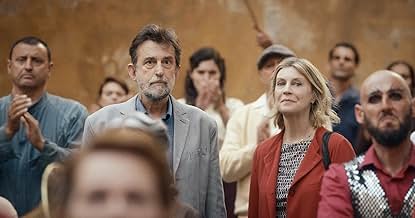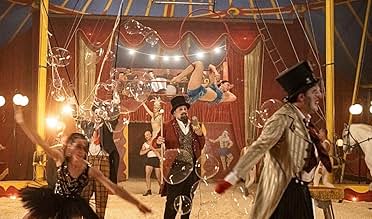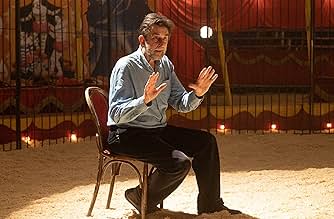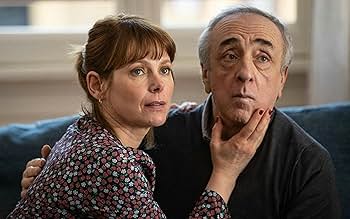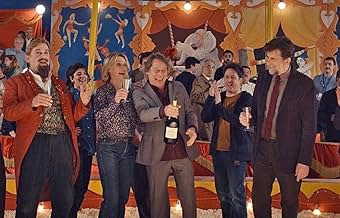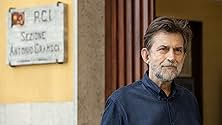ÉVALUATION IMDb
6,7/10
3,8 k
MA NOTE
Giovanni réalise, au milieu de mille incertitudes, un film sur la vie d'un intellectuel communiste en 1956, année fatidique de l'invasion soviétique de la Hongrie. Entre-temps, son mariage e... Tout lireGiovanni réalise, au milieu de mille incertitudes, un film sur la vie d'un intellectuel communiste en 1956, année fatidique de l'invasion soviétique de la Hongrie. Entre-temps, son mariage entre en crise.Giovanni réalise, au milieu de mille incertitudes, un film sur la vie d'un intellectuel communiste en 1956, année fatidique de l'invasion soviétique de la Hongrie. Entre-temps, son mariage entre en crise.
- Prix
- 2 victoires et 21 nominations au total
Avis en vedette
I liked the film as a whole, Moretti is certainly someone who loves cinema and in general all the art of old Italy, you can see everything in the protagonist played and representing himself, but I can't fully understand the intent because I don't know well the real communist ideologies or the Soviet ones or the Italian Communist Party. But I can appreciate the desire to create well-made characters, in a world where cinema is produced only by big houses that do not grasp the essence of art in any way the protagonist lives his life completely in art, in his own art and in the art of others, and when he gets the chance he analyzes art in all the ways it's possible to do it and all he does is bring his art back to the screen, no matter the money, just instinctively as an artist, it's the first film I've seen by this director and consequently I don't know if it's below or above average compared to the others, but I give it a 7 because it's a film that has soul and the desire to tell something.
I found this film very enjoyable and funny. Of course it's not the first film about a director making a film, and I had only seen two of his films before so I can't tell to what extent this is "always the same Moretti stuff", but to me this film seemed rather unique and original. Nanni Moretti himself (called Giovanni in the film) is the main protagonist here, and he is mightily annoying, talking endlessly without listening properly to others including his wife, with a voice that reveals a clear sense for his own importance. This is however obviously ironic and self-deprecating (the Guardian reviewer, who slaughtered this film, apparently missed that, which is hard to believe but maybe something got lost in translation?) in an often very funny way. It helps to know such people in real life for appreciating his portrayal. Otherwise he is directing a film about Italian communists' reaction to the 1956 Hungarian uprising while the Italian communists host a Hungarian circus in Rome. He also deranges another film in which his wife participates lecturing the director on the "correct" use and non-use of violence in films. Meanwhile his very convincing down-to-earth wife prepares to separate from him (the audience can clearly see why she would want that) with a counsellor as on her own she apparently doesn't manage to take this step on her own. There is some surreal stuff with nods to Fellini and Godard in the film, and apart from Moretti's misbehaviour and the breaking down of his marriage there's some politics, feminism, and thought about cinema back then and now in the film. Moretti's general state resonates well with what goes on it the film he makes and how he directs it. Sometimes there is more than one layer of irony and it is not necessarily easy to get it all, but I for sure got enough out of it. There is a fine line between annoyance and fun in Moretti's ironic self-portrayal, but this came out on the right side for me, just about. Ultimately there is some development in his personality in a somewhat more pleasant direction; he can confess his own uncertainty and vulnerability, but will it last? I wasn't very keen on the end, but also this was ironically broken, which was well needed to make it acceptable for me. The film has its flaws, but I was well entertained, and I raise my hat to Moretti for his self-irony.
On the occasion of his 70th birthday, Director Moretti sends a heartfelt love letter to his fans, reliving the themes that made him popular and acclaimed over the course of 50 years. The story jumps between three distinct layers: Moretti's own life, the movie he is shooting, and the movie he is about to make, with each providing its own share of humorous moments, successes, and of course, failures (due to Moretti's intrinsically pessimistic outlook). Compiled from both his own works and the works of those who have inspired him, particularly Federico Fellini, the movie is ultimately an observation of the passage of time, with a faint but lasting hope of a future. When you let it be.
In "The Sun of the Future," Nanni Moretti reinvents himself as a consummate filmmaker, expressing his views on the political world, streaming platforms, contemporary cinema, his personal life, and his relationship with his partner more forcefully than ever before. This astonishing Italian comedy delves into the critique of all these aspects through the film that the main character (played by Moretti) is filming.
Compared to "Dear Diary" (1993), which was more personal and, if I may say so, somewhat egocentric, "The Sun of the Future" stands out for being exceptionally political and romantic. This film perfects the autobiographical approach the director explored in his previous work.
The film serves as a starting point for an important debate about independent cinema and the strategies it must employ to survive in the streaming era. Moretti criticizes the current trend in which movies are expected to lay out their entire plot within the first two minutes, an illogical formula in his perspective and characteristic of the senseless surge of streaming in recent years.
Ultimately, "The Sun of the Future" is a work imbued with an underlying sentiment: love. Love is the driving force and the brake in the entire narrative, a crucial element that can change things for better or for worse.
Compared to "Dear Diary" (1993), which was more personal and, if I may say so, somewhat egocentric, "The Sun of the Future" stands out for being exceptionally political and romantic. This film perfects the autobiographical approach the director explored in his previous work.
The film serves as a starting point for an important debate about independent cinema and the strategies it must employ to survive in the streaming era. Moretti criticizes the current trend in which movies are expected to lay out their entire plot within the first two minutes, an illogical formula in his perspective and characteristic of the senseless surge of streaming in recent years.
Ultimately, "The Sun of the Future" is a work imbued with an underlying sentiment: love. Love is the driving force and the brake in the entire narrative, a crucial element that can change things for better or for worse.
I didn't like this movie at all. Perhaps this was a movie for die hard Moretti fans that saw all his movies? For me the story was very weak, the pace was utterly slow and clearly they should prohibit certain directors to act in their own movies. There were some nice shots and sure I could smile a few times. I guess a metafilm can work, but I couldn't relate to neither one of the stories and both of the stories were quite superficial and unexciting. In short: I agree with the reviewer of the gardian who writes: "I'm sure the future will be brightened by another, better Moretti film - this one is best forgotten."
Le saviez-vous
- AnecdotesSelected to compete for the Palme d'or in the 2023 Cannes Film Festival. This is the ninth time that a film from director Nanni Moretti is selected at Cannes; every movie he made since "Caro diario" has been at Cannes, he even won the Palme d'or in 2001 with "The Son's Room."
- ConnexionsFeatures La dolce vita (1960)
Meilleurs choix
Connectez-vous pour évaluer et surveiller les recommandations personnalisées
- How long is A Brighter Tomorrow?Propulsé par Alexa
Détails
- Date de sortie
- Pays d’origine
- Langues
- Aussi connu sous le nom de
- A Brighter Tomorrow
- Lieux de tournage
- sociétés de production
- Consultez plus de crédits d'entreprise sur IMDbPro
Box-office
- Budget
- 12 284 110 € (estimation)
- Brut – à l'échelle mondiale
- 6 668 544 $ US
- Durée1 heure 35 minutes
- Couleur
- Rapport de forme
- 1.85 : 1
Contribuer à cette page
Suggérer une modification ou ajouter du contenu manquant

Lacune principale
What is the German language plot outline for Vers un avenir radieux (2023)?
Répondre
![Regarder Trailer [OV]](https://m.media-amazon.com/images/M/MV5BZjUxOGY3NjUtN2RiNy00NDlkLWE4MGYtZjkxMTU2MmNmOTBmXkEyXkFqcGdeQXRyYW5zY29kZS13b3JrZmxvdw@@._V1_QL75_UX500_CR0)

